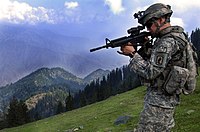Nine US troops killed in Afghanistan as Taliban attack base
Tuesday, July 15, 2008
On Sunday, nine United States troops were killed in Afghanistan after Taliban militants attacked an outpost in the Kunar Province near the Pakistan border.
The Battle of Wanat, a fight in a mountainous village in the Dara-I-Pech district, began at 4:30 am local time (UTC+4:30), just before dawn, with insurgents firing from homes and a mosque in Wanat.
"The insurgents went into an adjacent village, drove the villagers out, used their homes and a mosque as a base from which to launch the attack and fire on the outpost," said Mark Laity, a spokesperson for NATO. "Some of the insurgents also then attacked. I think it looks as if they made a brief breach into the base and were repelled."

A Taliban force estimated to number in the hundreds then tried to overrun the outpost, which had only been occupied for several days prior to the attack, according to NATO's International Security Assistance Force (ISAF).
The outpost, which contained troops from ISAF and the Afghan army, was able to organize and call in air support and drive back the assault, which had been able to penetrate the base perimeters. An estimated 40 militants were killed in the battle, and 15 US troops have been reported wounded. The fighting continued until mid-afternoon.
"Instead of looking at it necessarily from the perspective of the Taliban or terrorists being more aggressive in coming after NATO or U.S. forces or Afghan forces, in this particular case it was an example of NATO, U.S. and Afghan forces being aggressive in combatting cross-border infiltration," said Sean McCormack of the United States Department of State.
"The attack on Sunday was a carefully planned one, with upward of 200 insurgents, to give it weight of force," said Captain Michael Finney, acting spokesperson for ISAF.
Analyst Haroun Mir, deputy director of Afghanistan's Center for Research and Policy Studies, said the attack showed superior planning. It was clear evidence of Al-Qaeda in the area, he claimed. He pointed to recent incidents, such as a major jailbreak in Kandahar in June as evidence of increased capability of the insurgents.
Related news
- "Prisoners escape from Afghan jail after Taliban attack" — Wikinews, July 13, 2008
Sister links
Sources
- Aunohita Mojumdar. "Outpost attack in Afghanistan shows major boost in militant strength" — The Christian Science Monitor, July 15, 2008
- AP. "Attack on U.S. base in Afghanistan kills 9 troops" — MSNBC News, July 14, 2008
- Jon Hemming, Reuters. "U.S. Troops died in Taliban attempt to storm base" — Yahoo! News, July 14, 2008

